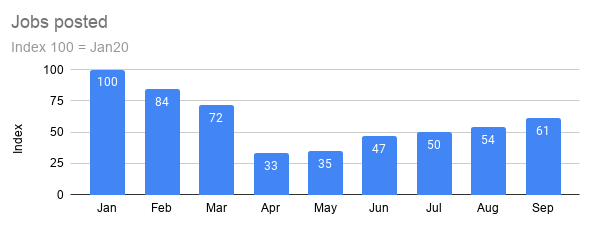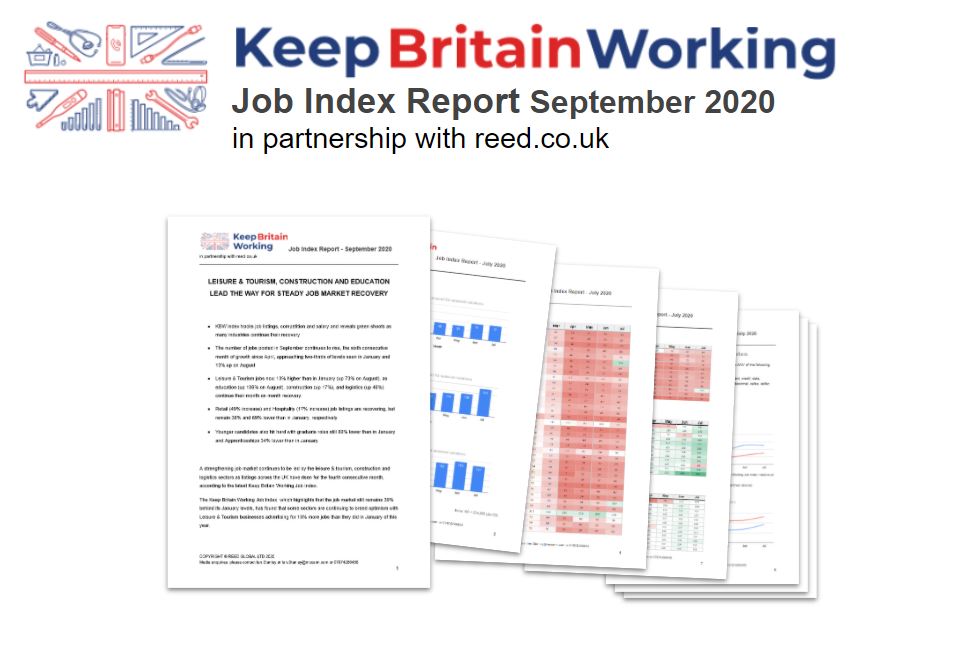A strengthening job market continues to be led by the leisure & tourism, construction and logistics sectors as listings across the UK have risen for the fourth consecutive month, according to the latest Keep Britain Working Job Index. There’s a link to download the full report at the bottom of page

The Keep Britain Working Job Index, which highlights that the job market still remains 39% behind its January levels, has found that some sectors are continuing to breed optimism with Leisure & Tourism businesses advertising for 13% more jobs than they did in January of this year.
Positive monthly increases in September are also found in advertised roles for education (106% increase), construction (17% increase), and logistics (46% increase) that continued their strong recovery in the last month.
However, job applications per role now stand at more one and half times the level of January 2020 as competition for roles is increasing and stand at the second highest levels recorded this year. Some sectors are seeing up three times as many applications per vacancy compared to January. This tallies with ONS figures finding that people claiming out of work benefits have now risen to 2.7 million – the highest levels since 1992.
The regional recoveries
Regionally, there are still issues for London, which is still the only region in England, Wales and Scotland to be posting below 50% of the jobs it did in January, even after the largest month on month increase, a 31% increase on August. As such, it also has the highest competition for vacancies at more than twice January levels – an issue that could soon see more people look outside of London in search of new roles.
In contrast, the north east has recovered impressively from a low of 32 percentage points in April, to 79 percentage points in September – just 21% below January levels. The only region to come close is East Anglia (at 76 percentage points), where job listings have remained relatively robust throughout the pandemic, likely due to the agricultural and scientific industries in the region.
“As we come to the end of furlough, new jobs are being created and some sectors are delivering really encouraging news. The businesses that are starting to grow once more have adapted and are now recruiting and bringing people back from furlough to ensure this extra talent makes them stronger. It is this positive attitude, together with their adaptability that will make these businesses valuable. If we are to continue this progress, restrictions aside, we must continue to learn and evolve. It is the adaptable and dynamic who will succeed.
“Business leaders should also remember that this is an opportunity to hire. There is an abundance of talent available – as demonstrated by applications per role being almost twice the amount of January – with many able to start immediately. This is a good time for businesses to invest in people and to strengthen their talent to grow. The forward thinking will have an opportunity to hire those that would not normally have be available and to expand and reshape their businesses as a result.”
James Reed, Co-Founder of Keep Britain Working and Chairman of Reed
The young and the lower paid in trouble
The Keep Britain Working Job Index also highlights concerns for those in entry level positions such as graduate or apprenticeship jobs. When compared to January graduate roles are still 80% lower than in January and apprenticeship roles 34% lower than in January. This is causing fierce competition for jobs in these areas with applications for each graduate role more than four times the volume of January (increase of 305%) whilst apprenticeship roles receive one and a half times (55% increase) the applications they did in January.
We have also seen the volume of traditionally lower paid or temporary roles in administration slip as much as 67% since January, with competition for the average role increasing by 136% since the start of the year.
Additionally, white collar roles are still lagging behind non-white collar roles, for the number of job vacancies available. This follows the pattern seen since April.
“I have a major concern for young and lower paid workers in our economy. They are not only the bedrock for many businesses, they are also the workforce of the future. With graduates and apprentices now having to battle for a very limited number of roles it means that more young people will find it harder to get their career started. This will have particularly lasting effects on them and wider society. The apprenticeships levy should be urgently reviewed so more businesses and people can make the most of this route.”
James Reed, Co-Founder of Keep Britain Working and Chairman of Reed







